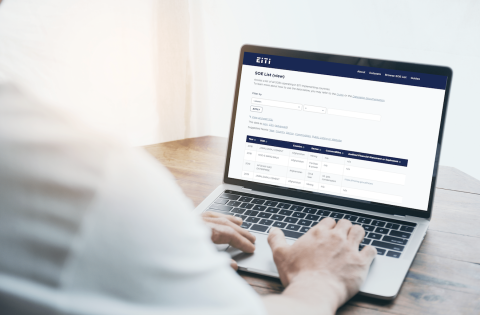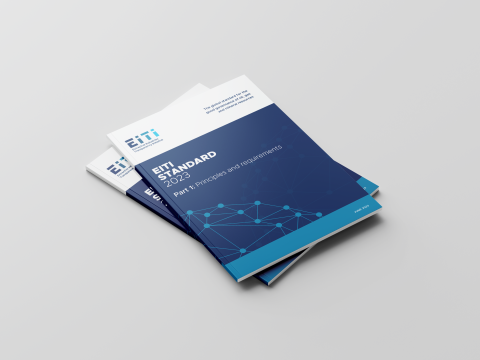
Iraq: EITI’s biggest OPEC member on track to systematic transparency
Iraq: EITI’s biggest OPEC member on track to systematic transparency
A will and a way: as Iraq starts its second Validation, it has a chance to lead on systematic transparency.
95% of government revenues in Iraq comes from oil and gas sales. Ensuring the sector is transparent and open is essential for the wider economy and Iraqi society. The months leading up to Iraq’s second Validation demonstrated how countries can make swift progress in systematically disclosing EITI data, given the right combination of political will and technical engagement.
High level support for Iraq EITI came from Deputy Prime Minister and Minister of Oil Thamer Ghadhban “Greater transparency has my full support,” he told the Iraq EITI multi-stakeholder group (MSG) meeting he chaired on 8 April. On the technical side the Minister committed to “move forward with publishing monthly production and export figures through the Ministry of Oil websites, national oil companies’ financial statements on their respective websites and, where companies agree, we will disclose our oil and gas contracts.”
Iraq has been temporarily suspended since its first Validation. This galvanised Iraq EITI to overturn the suspension by going further and releasing previously undisclosed data.
A series of firsts – turning commitments into policy
EITI reporting has shown the Iraqi government’s heavy reliance on oil and gas revenues for its income. This reliance adds further pressure on the economy. The IMF estimates that every USD 1 fluctuation in international oil prices leads to fluctuations in domestic government revenues of around 0.6% of GDP. Dramatic fluctuations can make it difficult for governments and other stakeholders to build an accurate picture of revenue management. To combat this, the Government has disclosed significant new information on the sector for the first time. The 2016 EITI Report and its addendum include information such as coordinates for all oil fields held by National Oil Companies (NOCs), calculations of unpaid sub-national transfers, called petrodollars, to the Regional Governorates and detailed information on companies’ social expenditures. The calculations of unpaid petrodollar allocations are particularly stark. Less than 10% of petrodollar allocations were actually transferred in practice. Al-Basrah was the only province to receive its shares of oil and gas revenues.
The government also agreed its policy on disclosing extractives contracts. The policy commits the government to publish all contract templates and provisions, conditions, addendums and attachments of oil and gas service contracts. However, the policy is to only to publish the full text of contracts in cases where the contracting company agrees. From 2021 however, Iraq will need to publish the full text of all contracts in line with new requirements of the 2019 EITI Standard. Building on the EITI Companies expectations, EITI Supporting Companies should support Iraq’s contract disclosure.
The MSG also agreed to publish monthly production data on the Ministry of Oil website, matching SOMO’s monthly crude oil export data on the Iraq EITI website, and national oil companies’ unaudited financial statements (including those of Basra Oil Company, Midland Oil Company, Missan Oil Company and North Oil Company).
Knitting the threads together
Iraq now has the chance to lead on systematic disclosures of EITI data in its region. An IEITI study of the national oil companies’ financial statements, supported by the International Secretariat, will highlight the information that could be systematically disclosed annually on their financial relations with government. The Ministry of Oil’s plans to routinely disclose disaggregated data on licenses, production and export on its website will provide timelier data that is highly sought after by civil society, parliamentarians and industry, including commodity traders. In the longer-term, the EU and World Bank’s support for public finance management reform will provide the basis for routine public disclosure of government oil and gas revenues, including through a revenue transparency portal operated by the Ministry of Finance.
Companies such as BP, Shell, Total, ENI, Gazprom, Rosneftand Lukoil are required by EU and Canada legislation to report their payments. While not yet disaggregated to levels required by the EITI, International oil companies (IOCs) reports in overseas jurisdictions, combined with their monthly performance reports to the Ministry of Oil, provide a basis for systematic disclosure of payments to and from government by companies. IOCs could lead on disclosing details of their social expenditures, service contracts and payments to government. Leadership from EITI Supporting Companies active in Iraq, such as BP, which operates the country’s largest oilfield Rumaila would operationalise the EITI Supporting Companies expectations and provide a strong example for other IOCs in Iraq.
“I think disclosure requirements under EITI can be an opportunity to systematise and streamline various reporting obligations, reducing the reporting burden and ensuring the provision of timely data with government,”says Zaid Elyaseri, BP’s Country Manager for Iraq.
Addressing the global agenda
Iraq is also making headway on new aspects of the EITI Standard set to be introduced in June. It is exploring innovative ways of collecting gender-disaggregated data. The MSG is taking gender into consideration by drawing on the perspective of women in key positions of public finance management in the Ministry of Finance and the Federal Board of Supreme Audit. Dr Nidhal Abdul-Zahra, Director-General of the Federal Board of Supreme Audit and member of the IEITI MSG, expressed her hope that gender data will be used when considering reforms “We expect this data to be useful to support government reforms.”
Iraq is also planning to include the collection of data on gas flaring and environmental impact assessments as it finalises its 2019-2020 EITI workplan.
“Iraq is using the EITI to address issues of concern for Iraqis, including the gender impact of the extractive industries and environmental aspects of the industry, such as widespread gas flaring,”says Dr Nidhal Abdul-Zahra
Analysing and acting on disclosed data
Information must be used to be useful. Iraq’s nine years of EITI data on corporate income tax payments can inform reforms of tax administration. Data on unpaid petrodollar allocations could support improvements in the administration of subnational transfers. Data on oilfields and production could support a more evidence-based debate about the efficiency and contribution of the Iraqi oil and gas sector. This is a moment of opportunity.





